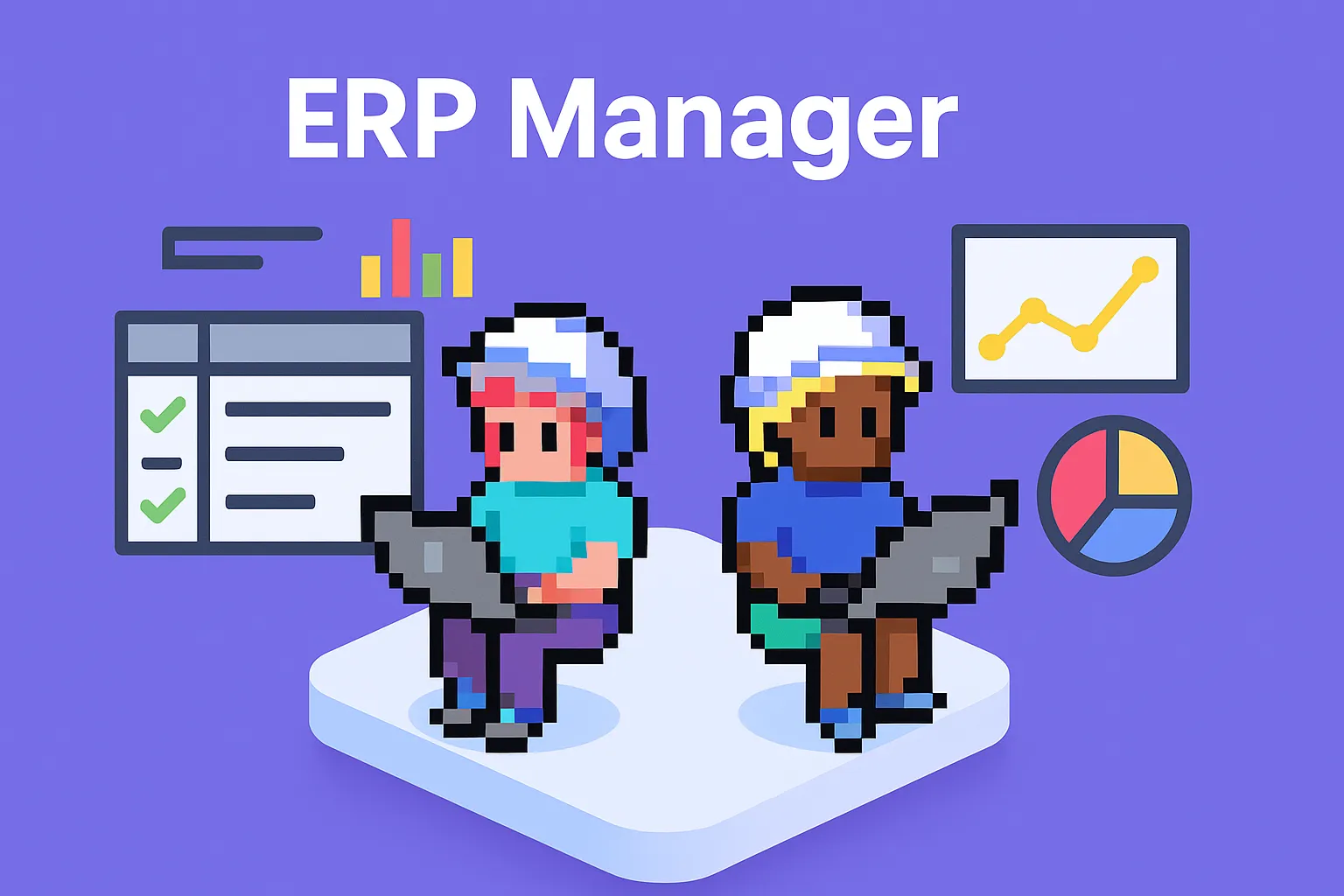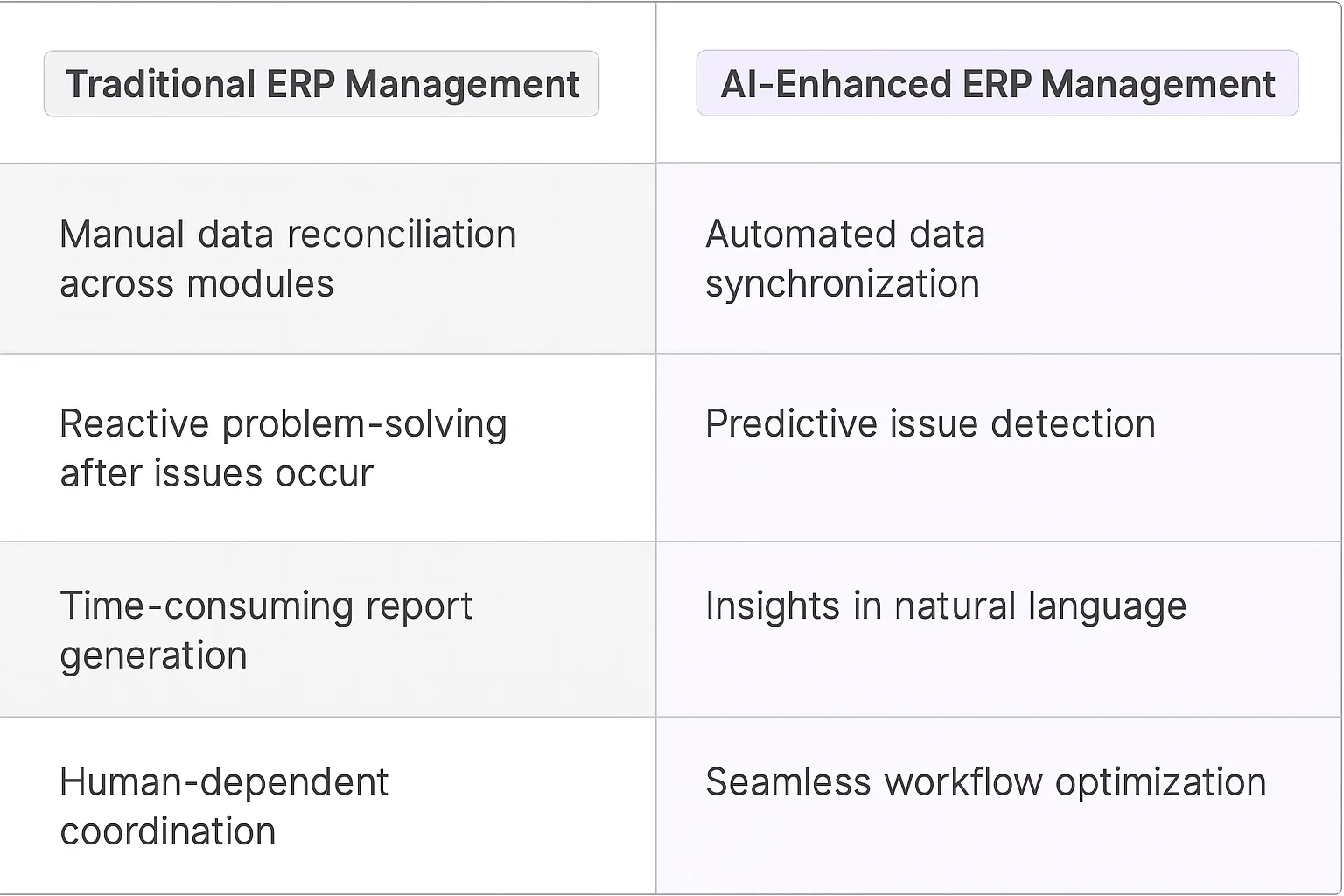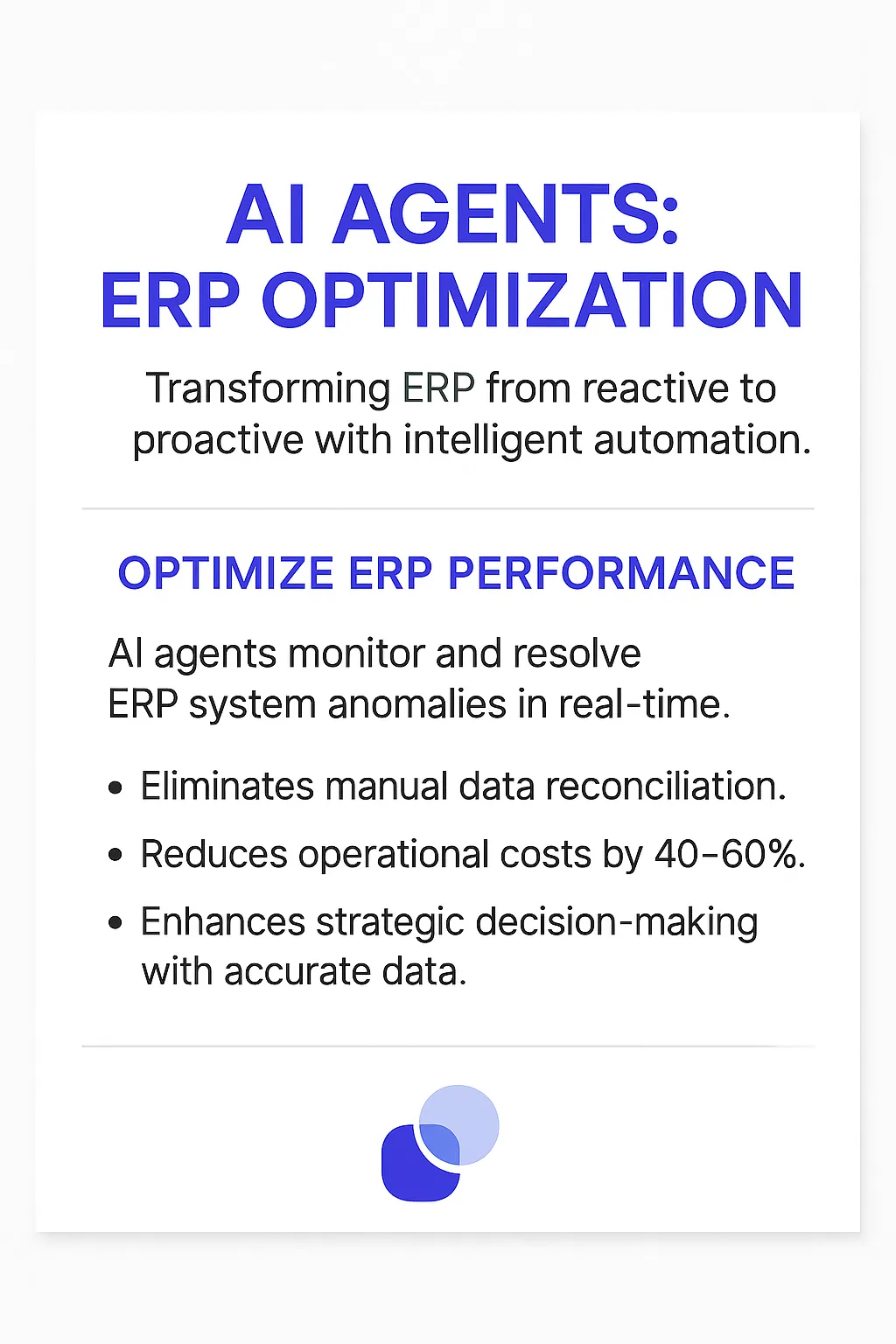Enterprise Resource Planning Manager is a sophisticated system that coordinates and optimizes core business processes across an organization's departments. It serves as the central nervous system for operations, connecting finance, inventory, human resources, and supply chain functions. When enhanced with AI capabilities, these systems evolve from static data repositories into dynamic, predictive platforms that actively optimize resource allocation and business processes.

Traditional ERP management relied heavily on human operators manually coordinating between different modules and departments. Teams would spend countless hours reconciling data discrepancies, updating records across systems, and trying to maintain data consistency. The process was error-prone and created significant bottlenecks, especially during month-end closes or system upgrades.
Companies typically employed teams of ERP specialists who had to constantly monitor system performance, troubleshoot issues, and manage routine maintenance tasks. This approach not only increased operational costs but also led to delayed response times and reduced system efficiency.
AI Agents fundamentally transform how organizations handle ERP operations through intelligent automation and predictive capabilities. These digital teammates can simultaneously monitor multiple ERP modules, detect anomalies in real-time, and take corrective actions before issues escalate.
The most compelling advantage is their ability to learn from historical data patterns. When an AI Agent encounters a system error or performance degradation, it doesn't just follow a predetermined script - it analyzes past incidents, evaluates successful resolution patterns, and applies the most effective solution. This learning capability means the system gets smarter and more efficient over time.
Cross-module optimization becomes significantly more effective with AI Agents. They can identify interdependencies between different ERP components and automatically adjust configurations to maintain optimal performance. For example, when an AI Agent notices increased load in the inventory management module during peak seasons, it can automatically reallocate system resources to prevent bottlenecks.
Data accuracy and consistency improve dramatically as AI Agents continuously validate information across modules, flag discrepancies, and maintain audit trails. They can process massive amounts of transactions while ensuring compliance with business rules and regulatory requirements - a task that would overwhelm human operators.
The financial impact is substantial: organizations typically see a 40-60% reduction in ERP-related incidents and a 30% decrease in system maintenance costs. More importantly, the improved system reliability and performance directly contribute to better business outcomes and user satisfaction.

When we look at enterprise software adoption curves, ERP systems have traditionally faced a cold-start problem: they require significant manual input before delivering value. AI agents fundamentally change this equation by creating immediate feedback loops.
The most compelling aspect is how AI agents can bridge the gap between different ERP modules. Instead of treating finance, inventory, and HR as separate silos, these digital teammates create a neural network of business processes. They're constantly learning from cross-functional data patterns, making each interaction more valuable than the last.
What's particularly fascinating is the network effect within organizations. As more departments engage with AI-enhanced ERP systems, the quality of insights and automation improves exponentially. This creates a powerful flywheel effect where increased usage leads to better predictions, which drives further adoption.
The key insight here isn't just about automation - it's about augmentation. AI agents aren't replacing ERP administrators; they're amplifying their capabilities by handling the heavy lifting of data analysis and routine decision-making, allowing humans to focus on strategic initiatives that truly move the needle.

The integration of AI agents into Enterprise Resource Planning management creates powerful new capabilities that fundamentally change how organizations handle their core business processes. Manufacturing companies deploy these digital teammates to automatically monitor inventory levels across multiple warehouses, triggering reorders based on sophisticated demand forecasting. This prevents costly stockouts while optimizing working capital.
In retail, AI-powered ERP managers excel at synchronizing data between point-of-sale systems, inventory databases, and financial records in real-time. When a customer returns an item in Boston, the system automatically updates stock levels, accounting entries, and makes the inventory available across all sales channels - something that previously required multiple manual touchpoints.
Healthcare organizations leverage these AI capabilities to maintain regulatory compliance while managing complex supply chains for medications, equipment, and supplies. The AI analyzes usage patterns, tracks expiration dates, and ensures proper documentation - reducing waste and maintaining audit trails automatically.
What makes these use cases particularly compelling is how the AI agents learn and adapt to each organization's unique processes over time. They don't just follow static rules - they identify patterns, flag anomalies, and suggest process improvements based on analyzing thousands of transactions and workflows.
A mid-sized auto parts manufacturer in Detroit implemented an ERP Manager AI Agent to tackle their complex supply chain and production scheduling challenges. The traditional ERP system generated mountains of data, but the human ERP managers spent countless hours manually analyzing reports and making adjustments.
The ERP Manager AI Agent transformed this process by continuously monitoring real-time production data, inventory levels, and supplier delivery schedules. When a key supplier reported a 3-week delay in raw materials delivery, the AI agent immediately recalculated production schedules across 12 assembly lines, adjusted worker shift patterns, and rerouted existing inventory to prioritize high-margin products.
What's particularly fascinating is how the AI agent learned the seasonal patterns of the business. It recognized that certain parts had higher demand during winter months and began automatically adjusting inventory thresholds three months in advance. This proactive approach reduced stockouts by 64% while simultaneously decreasing excess inventory carrying costs by 27%.
The most impressive aspect was the AI's ability to handle multi-variable optimization across the entire operation. When a major customer suddenly doubled their order volume, the AI agent balanced labor costs, machine capacity, material availability, and shipping schedules to propose three viable production scenarios - each with detailed cost-benefit analyses. The human ERP manager could then make an informed strategic decision rather than spending days crunching numbers.
This real-world application demonstrates how AI agents can augment human decision-making in complex manufacturing environments. The key isn't replacing human judgment, but rather empowering ERP managers to focus on strategic decisions while the AI handles the intricate tactical adjustments that keep operations running smoothly.
I recently spent time with a large hospital network in Boston that deployed an ERP Manager AI Agent to tackle their complex resource allocation challenges. The hospital's existing ERP system was drowning in data from multiple departments - everything from OR scheduling to pharmaceutical inventory to staffing schedules.
The ERP Manager AI Agent became their central nervous system for resource optimization. It analyzes patient admission patterns, procedure schedules, staff availability, and equipment utilization in real-time. During a recent flu season spike, the AI agent detected the surge pattern 48 hours before it hit peak and automatically adjusted staffing schedules across three facilities, reallocated mobile medical equipment, and modified pharmaceutical par levels.
The most fascinating aspect is how the AI agent learned to predict resource needs based on subtle correlations in historical data. It discovered that certain elective surgeries had higher complication rates on Mondays, leading to longer recovery times and increased resource demands. The system now automatically adjusts post-operative bed allocations and nursing schedules to account for this pattern.
One particularly impressive case occurred during a city-wide power outage. The AI agent immediately calculated resource requirements for backup power systems, identified critical patients requiring continuous care equipment, and generated an optimal patient transfer schedule to facilities with more robust power infrastructure. This happened in minutes, versus the hours it would have taken the human team to develop a comprehensive plan.
The results speak volumes: 31% reduction in patient wait times, 42% decrease in resource bottlenecks, and an estimated $4.2M annual savings in operational costs. But perhaps most importantly, the clinical staff report feeling more supported in their decision-making. The AI agent handles the complex resource calculations while healthcare professionals focus on what matters most - patient care.
This implementation shows how AI agents can transform healthcare operations from reactive to proactive. The key insight isn't about replacing human expertise - it's about augmenting clinical judgment with data-driven resource optimization at a scale and speed that humans simply can't match.
Implementing an ERP Manager AI Agent requires careful navigation of complex technical landscapes. Legacy systems often speak different languages - from ancient COBOL to modern APIs. The AI agent needs robust connectors and data transformation capabilities to interpret and process information across these diverse systems. We've seen companies struggle when their data structures aren't standardized, leading to the AI making decisions based on incomplete or mismatched information.
The effectiveness of an ERP Manager AI Agent lives and dies by data quality. Organizations typically discover their data hygiene isn't as clean as they thought - duplicate entries, inconsistent formats, and missing fields become glaringly obvious. The AI needs extensive training on company-specific data anomalies and business rules to handle these edge cases appropriately.
Employees who've spent years mastering ERP systems often view AI agents with skepticism. The transition requires thoughtful change management - not just training on new interfaces, but addressing fears about job security and shifting roles. Success stories show that positioning the AI agent as a tool that eliminates tedious tasks rather than replacing human judgment is crucial.
ERP systems house sensitive financial and operational data. The AI agent needs sophisticated permission structures and audit trails to maintain compliance with industry regulations. Organizations must implement robust security protocols to prevent the AI from accidentally exposing confidential information or making unauthorized system changes.
Measuring the true impact of an ERP Manager AI Agent isn't straightforward. While basic metrics like processing time improvements are easy to track, quantifying the quality of decision-making and error reduction requires sophisticated monitoring systems. Organizations need to develop new KPIs that capture both efficiency gains and accuracy improvements.
The initial setup and ongoing maintenance of an ERP Manager AI Agent demands significant resources. Companies often underestimate the need for specialized talent to train, monitor, and fine-tune the AI. The learning curve is steep, and organizations must be prepared for an extended period of parallel operations while the AI builds reliability.
The marriage of AI Agents and ERP systems marks a pivotal evolution in enterprise software. The data shows compelling results: 40-60% fewer incidents, 30% lower maintenance costs, and dramatic improvements in system reliability. But the real story isn't just about efficiency gains - it's about enabling organizations to operate at a level of sophistication and scale previously impossible with human operators alone. As these systems continue to learn and adapt, they're creating new possibilities for business optimization that will define the next generation of enterprise operations. The organizations that embrace these digital teammates today will have a significant advantage in navigating the complexities of tomorrow's business landscape.